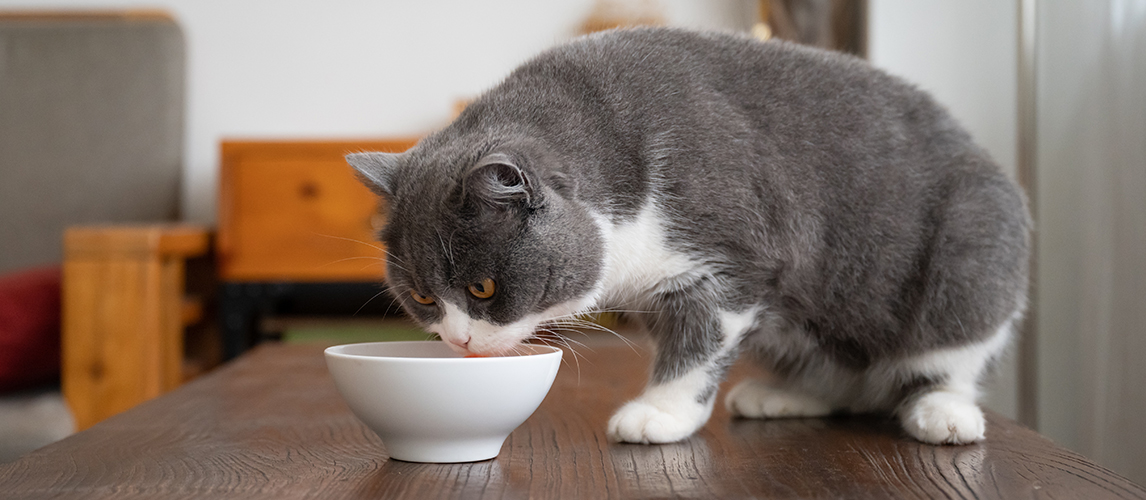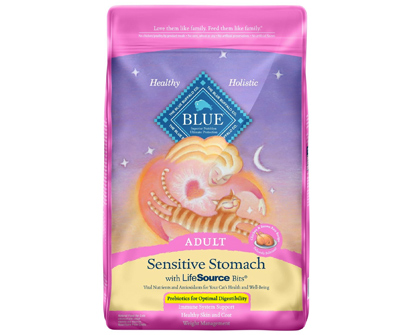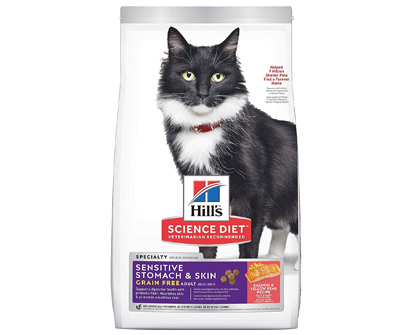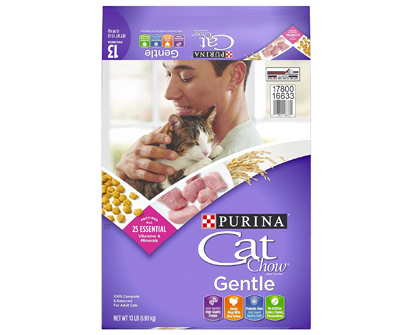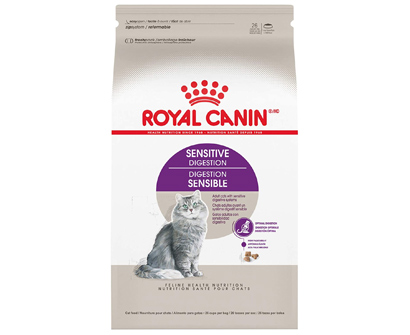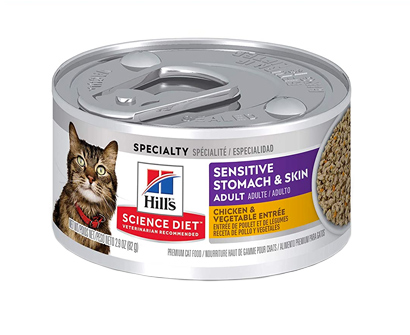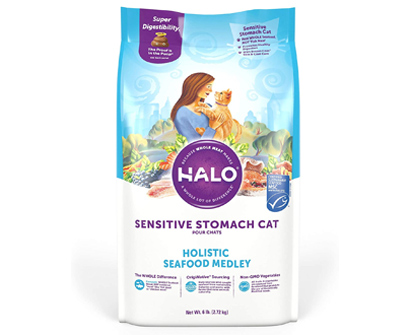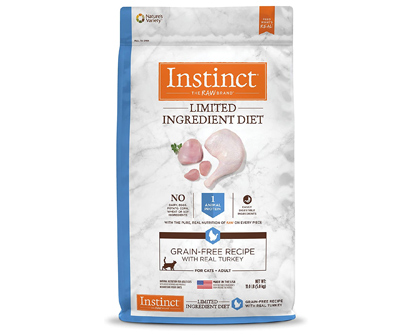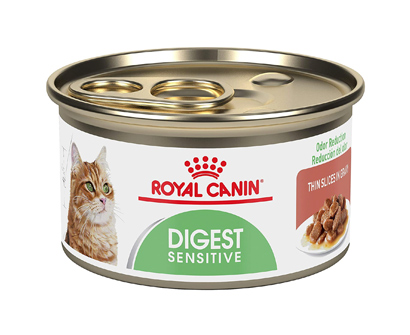- The Best Cat Food for Sensitive Stomachs
- 1. Blue Buffalo Cat Food for Sensitive Stomachs
- 2. Hill’s Science Diet Sensitive Stomach Dry Cat Food
- 3. Purina Cat Chow Sensitive Stomachs Cat Food
- 4. Royal Canin Sensitive Digestion Dry Cat Food
- 5. Hill’s Science Diet Wet Cat Food for Sensitive Stomachs
- 6. Halo Purely For Pets Sensitive Stomachs Cat Food
- 7. Instinct Cat Food for Sensitive Stomachs
- 8. Royal Canin Sensitive Stomachs Canned Cat Food
Cats can be fussy eaters and so finding the right food that gives them all the nutrition they need can be a bit of a challenge, especially if they have a sensitive tum to boot. Vomiting, regurgitation, gas and toilet issues can all be signs that your kit doesn’t have the happiest, stomach. So, if your vet has ruled out any more serious causes for your cat’s disrupted digestion then it may be time to switch to a diet that is kinder and more supportive to your feline’s upset tum. We take a look at some of the best cat food for sensitive stomachs to give you and your kit some food for thought.
The Best Cat Food for Sensitive Stomachs
1. Blue Buffalo Cat Food for Sensitive Stomachs
Key Features
High-quality chicken protein
Whole grains, vegetables and no fruit
No wheat, corn, soy or artificial nasties
Added prebiotics for digestive health
Omega 3&6 for skin and coat
Formulated with prebiotics to support digestive health and with quality protein and wholegrains, this sensitive stomach cat food is an all-round winner. While it does contain grains, is has no wheat or corn so supplies the fiber without the intolerance risk. As an adult cat food for everyday tum sensitivities, it is both tasty and goodness-packed, at a good value price too. Ideal for picky eaters and sensitive souls, you get quality chicken, managed carbs plus added fruit and vegetables. As well as the prebiotics, Blue Buffalo’s Sensitive Stomach dry food formula also packs in essential fatty acids, antioxidants, vitamins and minerals, making it one of the all-round best gastrointestinal cat food you can buy.
2. Hill’s Science Diet Sensitive Stomach Dry Cat Food
Key Features
Balanced dry food for adult cats
Salmon and chicken protein, grain free
Includes selected fruit and vegetables
Natural and prebiotic fiber for healthy digestive tract
Added taurine, plus vitamins and minerals
If you need a grain free cat food that is also easy for your sensitive kit to eat and digest, then this tasty dry kibble formula from Hill’s Science is worth a try. With salmon and whole chicken at the heart of the recipe, there are no potential digestive irritants such as wheat or corn, just added vegetables including peas, carrots and broccoli. And with natural fibers, this meal can also help to improve the consistency of your pet’s stools. Add in prebiotics for microbiome balance plus taurine and added vitamins and minerals, you get a well-balanced meal that is not going to irritate their stomach or allergies and keep your adult cat coming back for more.
3. Purina Cat Chow Sensitive Stomachs Cat Food
Key Features
Gentle formula for adult cats
Turkey as the main protein
Natural fiber blend
25 essential vitamins and minerals
Contains corn and soy
With turkey as its main protein source, Purina’s Cat Chow is a gentle formula that aims to reduce vomiting and barfing in your cat and give their irritated tum some peace. And, although it is gentle, it doesn’t skip on flavor while remaining really easy for your adult cat to digest. Added to the protein is natural fiber as well as 25 essential vitamins and minerals for overall vitality and health. And there are no artificial additives or flavors to be seen. And the ribbed, almost star-like shape of the kibble also makes it kind on the mouth and teeth, so a good choice for your more senior, stomach sensitive pet.
4. Royal Canin Sensitive Digestion Dry Cat Food
Key Features
Chicken with brewer’s rice
Beet pulp and fish oils; vitamins B, C, E & D
Added prebiotics for gut support
High energy concentration for smaller meals
Unique kibble shape for easy eating
Balancing prebiotics with digestible protein, Royal Canin’s Sensitive Digestion cat food is a good all-rounder when your kit’s tum is in full grumbling mode. This formula has quite a high energy density, but it does mean you can feed your gut-upset kit smaller meals without him missing out on any essential calories and nutrition. We like the shaped kibble in this sensitive stomach cat food, as they are smaller and shaped to be easier to chew and eat so a good bet for mouth and tum sensitive older kits. Use alone or mixed with a wet cat food for gentle, balanced nutrition. Contains rice, beet, wheat and corn.
5. Hill’s Science Diet Wet Cat Food for Sensitive Stomachs
Key Features
Wet formula in good value 2.9oz tins
Quality chicken and turkey protein
Grain-free with natural fibers
Balanced vitamins and minerals
Added omega-6 and vitamin E
If dry kibble is not your stomach-sensitive cat’s thing, then as a straight-forward wet cat food that can help with tum and skin issues, we think Hill’s Science Diet is a good value choice. Easy to digest and grain-free, this chicken and vegetable entrée is appetizing to look at and smells flavorsome without going over the top. Natural fibers help in stool formation and the grain-free formula is gentle on the stomach while still delivering all the nourishment, vitamins and minerals your cat needs to maintain a calmer tum and stay in good health. There’s omega 6 and vitamin E in there too for skin and coat condition, if hairballs are also a problem. This wet formula could also work as a sensitive stomach kitten food but consult with your vet for further advice.
6. Halo Purely For Pets Sensitive Stomachs Cat Food
Key Features
Whole-fish recipe, including whitefish and salmon
Contains selected non-GMO grains and vegetables
Includes dry blueberries, cranberries, carrots and sweet potatoes
Includes probiotic, bacillus coagulans
Added vitamin A, C, D and B12
If your kit is a fish-lover or you want them to benefit from a healthy, fish-oil based diet, Halo have created this dry ‘seafood medley’ specifically for the cat with a more sensitive tum. Containing whole fish protein, from whitefish and omega-rich salmon, enhanced with selected grains and non-GMO vegetables, this dry meal is easy to digest and supports the healthy functioning of your cat’s digestive system without irritating or stressing their gut. The selected combination of fish, whole grains and carbs ensures your sensitive cat is getting all their essential nutrition while boosting their digestive, skin, coat and all-round health. The carefully refined whole grains also makes the small kibble biscuits easy to digest, so used with a topper can also be a good choice for older cats. For a full list of our favorite options, see our round-up of the best senior cat food.
7. Instinct Cat Food for Sensitive Stomachs
Key Features
Single meat and vegetable formula
Digestible, cage free turkey
Raw meat topper on dry kibble
Grain, corn, soy and dairy-free
No artificial flavors or additives
If you have a grain-sensitive cat and need something special to help him with his stomach issues, Instinct’s grain free recipe could be his meal-time best-friend. This dry cat food for sensitive stomachs has a limited ingredient list – just one protein (cage free turkey) and one vegetable (peas) and that is its unique appeal. And it is also a coated dry kibble, layered with a delicious topper of frozen raw meat to really take him back to basics. There are no potential intolerance triggers in this 11-pound bag, and that includes grain, dairy, eggs, fish, potato, corn or soy. What’s left is a digestible and tum-friendly protein and enough essential nutrients, amino acids, vitamins and minerals to keep your cat and his grumbling tum in top form.
8. Royal Canin Sensitive Stomachs Canned Cat Food
Key Features
Delicious wet formula with gravy
Highly digestible protein – meat and fish
Helps to decrease stool odor
Balanced with vitamins and minerals
Added natural fibers
Serve your sensitive cat a gourmet-style meal to get him looking at his feed bowl in a whole new light with Royal Canin’s ‘thin slices in gravy’. Formulated for cat from the age of one who may have tummy sensitivities, this easy to digest and flavorsome wet cat food is also a good choice for fussy eaters. The highly digestible protein minimizes toilet odors and can also help maintain a healthy weight. It has also been well balanced with the essential vitamins and minerals your cat needs for sustaining optimal health. All in a delicious-looking cat food, with its own ‘jus’. Serve as it is or double up with Royal Canin’s Digestive Care dry cat food for a real, cat tum friendly treat.
Best Cat Food for Sensitive Stomachs Buying Guide & FAQ
What to Look for in a Best Sensitive Stomach Cat Food
Before choosing your kit’s new sensitive stomach cat food, make sure you check that it covers the following:
- Natural ingredients: making sure that their diet is as natural and as wholesome as possible will go a long way in helping to settle your cat’s problematic tum. And, by reducing any overly processed ingredients, as well as any artificial colors, preservatives and flavors, you are removing additives that are known triggers for sensitive digestive systems.
- Quality protein: your cat is born to be a carnivore and their digestive system has evolved to be lean, mean protein processing machines! They are very efficient at getting most of their nutritional requirements from meat – they require at least 26% of their diet to be protein to maintain a healthy muscle mass - and so their food needs to contain a high-quality protein source. Look for deboned whole meat such as poultry, beef or fish and avoid any food which has ‘meat by-product’ on the label. For a wider selection of choices, check out our high protein cat food guide.
- Healthy fats: healthy fats are essential for a smooth digestion as well as providing an energy source and supporting their overall condition. Omega fatty acids are also an excellent way to help maintain a healthy skin and coat. Just check the labels for fat quantities as you also need to make sure their diet is not too high in unnecessary calories.
- Low carb: cats are not natural carb lovers, and neither is their body, especially if they are on the sensitive system side so look for whole carbohydrates or even a no-grain formula if you know wheat and gluten is a potential trigger. However, your kit does need some fiber in their diet as long as it comes from an easily digestible source, such as sweet potatoes or beans.
- Nutritionally balanced: as with humans, your cat needs their food to be nutritionally balanced so that they get all the goodness they need to thrive. The best cat food for sensitive stomachs will take account of this so look for vitamins and minerals on the ingredient list to ensure a proper ratio of nutrients that are also easy to absorb. Cats with sensitive tums can also benefit from added supplements to their food, including prebiotics and probiotics to support a healthy digestion.
- Ease of eating: you also need to ensure the sensitive cat food formula is easy for a cat with a sensitive stomach to digest and so they can make the most of all those vital nutrients. Cat food with higher moisture levels, even if it’s a dry kibble can make all the difference to your cat’s tum and their overall dining enjoyment come mealtime.

What to Avoid Feeding a Cat With a Sensitive Stomach?
With a fickle digestion, it’s wise to avoid feeding your cat certain foods which could run the risk of triggering their sensitive stomach. The main things to avoid include:
- Dairy: Some cats, particularly as they get older, can become lactose intolerant. Lactose is a type of sugar found in many dairy products, especially milk and can lead to an upset stomach.
- Fatty foods: A diet rich in fat, especially saturated fat, will not only increase your cat’s calorie intake and run the risk of weight gain, but also lead to stomach problems.
- Raw fish: We know that fish makes an ideal protein source for your cat, but only when it is cooked, especially if he is on the sensitive side. Raw fish has higher levels of B1 thiamine which can be an irritant in stomach sensitive cats.
- Gluten: While wholegrains can actually help your cat’s tum thanks to its fiber content, some cats can be sensitive to the gluten levels it contains. If you know this is a trigger for your cat, look for a grain-free formula but ensure he is getting his fiber from another source. Check out our articles on high fiber cat food and grain free cat food.
How Can I Tell If My Cat Has a Sensitive Stomach?
The odd tum upset or coughing up a hairball is nothing usual and often there is no need to re-think their diet. They may also have a temporary upset tum if you have recently or suddenly changed their food or diet. However, there are some symptoms that if they persist could well be the sign of a stomach-sensitive cat, including:
- Vomiting or regurgitation of undigested food
- Regular bouts of diarrhea and/or constipation
- Excessive gas
- Loss of appetite or refusing to eat
- Noticeably drinking more water
- Unexplained weight loss
- Recurring skin issues and/or loss of coat condition
- Unexplained and uncharacteristic lethargy and fatigue

FAQ
Q: How can a sensitive stomach cat food help?
When feeding a cat with digestive issues, sensitive stomach cat food can help to ease their symptoms and reduce the risk of their mealtimes leading to an upset tum or gastro flare-up. A simpler, high-quality diet, with all the likely upset tum suspects avoided, can really help to heal an irritated digestive system and help your cat enjoy their food more, without the unpleasant consequences. The right ingredients, as well as added supplements such as probiotics in their diet, can also help to strengthen their digestion and make it easier for their body to process their food, for optimum nutrition and health.
Q: What causes a sensitive stomach for a cat?
If any more serious underlying causes for their upset stomach has been ruled out by your veterinarian, then there can be a host of reasons why your cat’s digestion does not seem happy. The main culprits include:
Hairballs: these hairy things are one of the main reasons why your cat will vomit. Although gross, hairballs are a natural part of their grooming routine and should normally cause no issues other than regurgitation to get rid of them. Find out more about hairball control cat food here.
Food intolerance: your cat may also be sensitive to certain foods, with dairy, corn and artificial additives and colorings typically the main offenders. Symptoms of food intolerance include digestion issues and vomiting as well as runny nose, eyes, coughing and scratching.
Bad foods: an out-of-date or bad batch of cat food is likely to lead your cat to be off color, and they may well vomit to get rid of the bad food in their tum. Some food stuffs are also toxic to cats, such as dairy, garlic, raisins and chocolate so be aware of what your kit may be eating.
Parasites: if your cat has not had their regular wormer and is looking a bit off color, then it could well be a touch of worms. Parasites such as roundworm, tapeworm, and threadworm can all cause a sensitive stomach and those unpleasant toilet side effects.
Their eating habits: eating rubbish, eating far too fast, or being fed far too much in one sitting can all lead to stomach and digestive issues so always be mindful of what and how much your cat eats. Food that’s too dry may also expand unpleasantly in their tum or you may not be consistent with their food, swapping from wet to dry if that is all that’s in the cupboard, potentially causing issues with their digestion.
Their age: as your cat gets older, their systems also age and their tum may not be as robust as it once was, leading to greater sensitivity when it comes to their food.
When it could be something more serious: if all other possible causes have been ruled out or your cat suddenly becomes ill, with severe vomiting and digestive issues or has stopped eating, it may be more than just a sensitive stomach so do get your cat back to the vet, pronto.
Q: How do I stop my cat vomiting after eating?
The key is to avoid the trigger that may be making them sick in the first place so observe how your cat eats and be more mindful of how and what you feed them. Ensuring they always have access to fresh, clean water, feeding them smaller portion sizes so they don’t over-eat and keep any trigger foods off the menu can all help to prevent the dreaded vomiting after they eat.
Changing your cat’s regular meal to a cat food specifically formulated for sensitive stomachs can also make a big difference and can be a wise move in the long run. Just make sure you make the swap gradually so that the change to a new food doesn’t actually exacerbate their stomach symptoms. Slowly add more of the new food and reduce their old over a transition period of a week or so, and hopefully, it will be happy tums all round.

